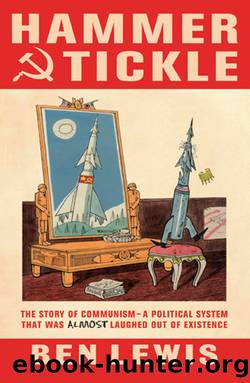Hammer and Tickle by Ben Lewis

Author:Ben Lewis [LEWIS, BEN]
Language: eng
Format: epub
ISBN: 9781780220758
Publisher: Orion
Published: 2011-06-15T16:00:00+00:00
From that letter, you might think that there was a sharp dividing line between the jokes told by ordinary people and the official humour of a humourless political system. That’s certainly what the jokers imagined. They read letters like Nikolai Kuritsin’s, and thought that their jokes were a thorn in the side of Communism. Yet, as in the thirties, there were many areas of overlap and subtle differences of degree between the jokes of the state and the jokes against the state.
Eulenspiegel, the German satirical magazine, serves as a case study in this complexity. It was founded in 1954 on the say-so of the East German Politburo. It inherited its name from another post-war satirical magazine called Ulenspiegel, which had been banned in 1950. But four years later, in the aftermath of the uprising of 17 June 1953, the state thought it wise to have some form of comic expression: students were authorised to establish cabarets in Berlin, Dresden and Leipzig (including the Rat der Spötter we encountered in the previous chapter) and the satirical magazine was relaunched. The magazine had the same brief as its other Communist counterparts. In 1956 the Central Committee spelt out that the construction of Socialism could ‘never be a subject for comedy or ridicule’, but that ‘the most urgent task of satire in our time is to give Capitalism a defeat without precedent’, which included, of course, exposing ‘backward thinking [and] holding on to old ideologies’. Every Thursday, the editor of Eulenspiegel went to the weekly Agitation Commission meeting in the Central Committee building in Berlin. There in the company of all the DDR’s other leading newsmen, he was advised by officials of the interests, themes and mood of the Party that week, which he and his team were to translate into cartoons and comic essays in their magazine. There was always a demand for cartoons with doves of peace.
In the 1950s Eulenspiegel’s print run was three hundred thousand, rising to half a million in the eighties – but they could have sold many more copies if there hadn’t been a permanent shortage of printing paper in the DDR. Despite the vast circulation, it was actually quite difficult to find a copy. The DDR had seventeen million citizens and Eulenspiegel was the only place where they could read even veiled criticism of the state they lived in.
Eulenspiegel was not simply the mouthpiece of the state; the situation was more complex than that. The state needed to employ the most talented humorists of the time, and they wanted to tackle the problems inside their society as well as in the West. Many of these humorists, though they were members of the Party and believed in Communism, also wanted to make it better. They saw the magazine as a chance to do this from within. Among these wannabe fifth columnists was Ernst Röhl, the former member of the Leipzig cabaret troupe Rat der Spötter, now the domestic-affairs editor of Eulenspiegel 1965–97. He’d begun writing for the magazine shortly after he was released from prison in 1962.
Download
This site does not store any files on its server. We only index and link to content provided by other sites. Please contact the content providers to delete copyright contents if any and email us, we'll remove relevant links or contents immediately.
| Anarchism | Communism & Socialism |
| Conservatism & Liberalism | Democracy |
| Fascism | Libertarianism |
| Nationalism | Radicalism |
| Utopian |
The Secret History by Donna Tartt(16658)
The Social Justice Warrior Handbook by Lisa De Pasquale(11494)
Thirteen Reasons Why by Jay Asher(7801)
This Is How You Lose Her by Junot Diaz(5798)
Weapons of Math Destruction by Cathy O'Neil(5046)
Zero to One by Peter Thiel(4834)
The Myth of the Strong Leader by Archie Brown(4795)
Promise Me, Dad by Joe Biden(4455)
Beartown by Fredrik Backman(4433)
Stone's Rules by Roger Stone(4422)
How Democracies Die by Steven Levitsky & Daniel Ziblatt(4413)
The Fire Next Time by James Baldwin(4350)
100 Deadly Skills by Clint Emerson(4085)
A Higher Loyalty: Truth, Lies, and Leadership by James Comey(4039)
Rise and Kill First by Ronen Bergman(4020)
The David Icke Guide to the Global Conspiracy (and how to end it) by David Icke(3891)
The Farm by Tom Rob Smith(3878)
Secrecy World by Jake Bernstein(3788)
The Doomsday Machine by Daniel Ellsberg(3737)
